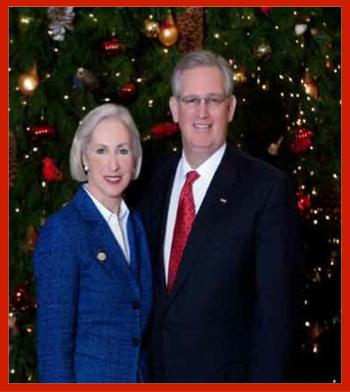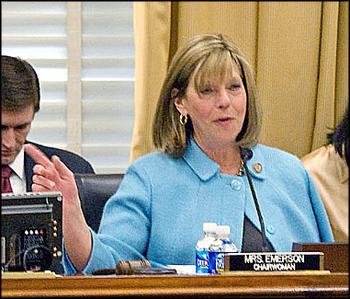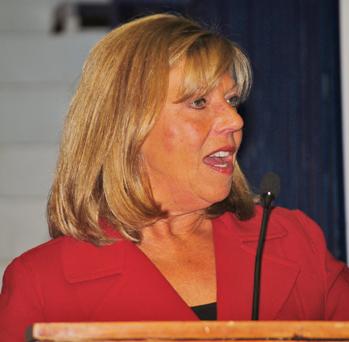
Submitted by
JEFFERSON CITY - Gov. Jay Nixon is encouraging the nomination of deserving Missourians for the Citizen Service Before Self Honors, which recognize and honor ordinary Americans who become extraordinary through their indomitable courage and selflessness.
The Governor said there have been many recent instances of Missourians distinguishing themselves in serving others. Three civilians will be selected from among 20 national finalists to receive the honors from recipients of the Medal of Honor, the nation's highest award for valor, at a March 25th ceremony at Arlington National Cemetery near the Tomb of the Unknowns. The recipients of the Medal of Honor comprise the congressionally chartered Medal of Honor Society.
Gov. Nixon and the Medal of Honor recipients encourage the nomination of any American civilian who has clearly demonstrated a willingness to sacrifice for others, whether through a single act of extraordinary heroism at risk to one's life or through a prolonged series of selfless acts. The nominee's actions must epitomize the concept of "service before self" and must be performed "above and beyond" one's professional area of responsibility or conduct. In 2009, David Bryan of Kansas City received the award for rescuing a motorist from a burning vehicle on Interstate 70 near Higginsville.
The nominations are being accepted online at www.CitizenServiceBeforeSelfHonors.org by The Congressional Medal of Honor Foundation, a non-profit organization founded by the Congressional Medal of Honor Society to perpetuate the Medal of Honor's legacy of courage, sacrifice, selfless service and patriotism. The website explains the criteria for nominating someone for the honor. The nomination period for the 2013 Citizen Service Before Self Honors ends Dec. 28, 2012
Since it was established by President Lincoln as our nation's highest award for military valor, the Medal of Honor has been awarded fewer than 3,500 times. There are fewer than 85 living recipients of the Medal, ranging in age from 24 to 95.

“During the Christmas season, Missourians gather together in joy and celebration with family and friends. This is also a time when we give special thanks for those who are dear to us, for our faith, and for the many blessings in our lives.
“At the holiday dinner table in many Missouri homes, there will be an empty seat because a son or a daughter, or a mother or a father, is overseas serving in our nation’s armed forces. They are thousands of miles away from Missouri and from their families this holiday season – protecting our country, and protecting us.
“I ask that in your thoughts and prayers this Christmas that you remember those serving in the military. Our prayer is that they are kept safe, even as they put themselves in harm’s way on our behalf, and that they return home soon. Please remember the families of those who are serving, as well, as they especially miss their loved ones at this time of year.
“The message of Christmas is one of joy, love and peace, and it has endured for more than two thousand years. In that spirit, Georganne and I wish all Missourians a safe, happy and healthy Christmas season, and a new year filled with joy and peace. May God continue to bless our great state of Missouri.”

By Kent Hampton
At 7:55 a.m. Hawaii time, a Japanese dive bomber bearing the red symbol of the Rising Sun of Japan on its wings appears out of the clouds above the island of Oahu. A swarm of 360 Japanese warplanes followed, descending on the U.S. naval base at Pearl Harbor in a ferocious assault. The surprise attack struck a critical blow against the U.S. Pacific fleet and drew the United States irrevocably into World War II.
With diplomatic negotiations with Japan breaking down, President Franklin D. Roosevelt and his advisers knew that an imminent Japanese attack was probable, but nothing had been done to increase security at the important naval base at Pearl Harbor. It was Sunday morning, and many military personnel had been given passes to attend religious services off base. At 7:02 a.m., two radar operators spotted large groups of aircraft in flight toward the island from the north, but, with a flight of B-17s expected from the United States at the time, they were told to sound no alarm. Thus, the Japanese air assault came as a devastating surprise to the naval base.
Much of the Pacific fleet was rendered useless: Five of eight battleships, three destroyers, and seven other ships were sunk or severely damaged, and more than 200 aircraft were destroyed. A total of 2,400 Americans were killed and 1,200 were wounded, many while valiantly attempting to repulse the attack. Japan's losses were some 30 planes, five midget submarines, and fewer than 100 men. Fortunately for the United States, all three Pacific fleet carriers were out at sea on training maneuvers. These giant aircraft carriers would have their revenge against Japan six months later at the Battle of Midway, reversing the tide against the previously invincible Japanese navy in a spectacular victory.
The day after Pearl Harbor was bombed, President Roosevelt appeared before a joint session of Congress and declared, "Yesterday, December 7, 1941--a date which will live in infamy--the United States of America was suddenly and deliberately attacked by naval and air forces of the Empire of Japan." After a brief and forceful speech, he asked Congress to approve a resolution recognizing the state of war between the United States and Japan. The Senate voted for war against Japan by 82 to 0, and the House of Representatives approved the resolution by a vote of 388 to 1. The sole dissenter was Representative Jeannette Rankin of Montana, a devout pacifist who had also cast a dissenting vote against the U.S. entrance into World War I. Three days later, Germany and Italy declared war against the United States, and the U.S. government responded in kind.
The American contribution to the successful Allied war effort spanned four long years and cost more than 400,000 American lives.
As always, it is an honor to serve you in the Missouri House. If you would like to discuss any issue, please call 573-751-3629. You can also email me at Kent.Hampton@house.mo.gov. I look forward to hearing from you.

Scarce supplies of crops lead to higher costs for feed and trickle through our economy until they reach us in the form of higher prices at the grocery store. Along the way, they can hit businesses from the auto dealership to the local bank.
From our farms and ranches come our food, along with jobs, investment and all kinds of economic activity in rural communities. Agriculture is the first domino in a long chain of economic events that, good or bad, affect pretty much every family and business in America. On the good side of the balance sheet, our producers deliver. They are responsible for the world’s safest, most abundant, most affordable supply of food. The American grocery bill is lower than that of any other developed nation, and agriculture is largely responsible for a narrowing trade deficit between the U.S. and the rest of the world.
But when times are tough, we run the risk of losing an increasing share of the family budget to food costs, and we risk losing family businesses in agriculture entirely. Strong agricultural policy gets rural America though the tough times, and we have to be sure it continues to guarantee the presence of these local producers in our counties and communities.
Every August, I take several days to see the latest advancements, investments and occurrences in Southern Missouri agriculture. This year, I’m seeing a ranch for alpacas, visiting a sawmill, taking a look at the first peanut farm I’ve ever seen, and talking about flood protection with the Mississippi River Commission. But nearly every usual topic on the Farm Tour is going to be overshadowed by drought.
Like nothing else, the drought has highlighted the ramifications of letting ag disaster programs lapse. Frustrations abound without a clear plan to pass a Farm Bill, with some livestock disaster assistance programs allowed to expire, with a debate raging over the cost of food allowed to overshadow the costs faced by producers of food. Agriculture has always been about good energy policy, good tax policy and good trade policy – but for the moment we have to focus on good ag policy.
As I listen to what these producers have to say about the near-term future of agriculture and their businesses, I always bear in mind how valuable these folks are to Southern Missouri. They are taking on risk, they are innovating in the field, on the ranch and at the dairy farm, and they are doing it with their own blood, sweat and – this year – some tears.
Supporting agriculture means being there when this vital industry needs us most. Today, we’re presented with a perfect case study in how bad things can get on the ranch, on the farm. After this year, we have every reason to renew our commitment to keep America at the forefront of an industry that feeds us as well as the rest of the world.
Jo Ann Emerson of Cape Girardeau represents the Eighth District of Missouri in the U.S. House of Representatives. Her Cape Girardeau Office may be reached at 573-335-0101.


